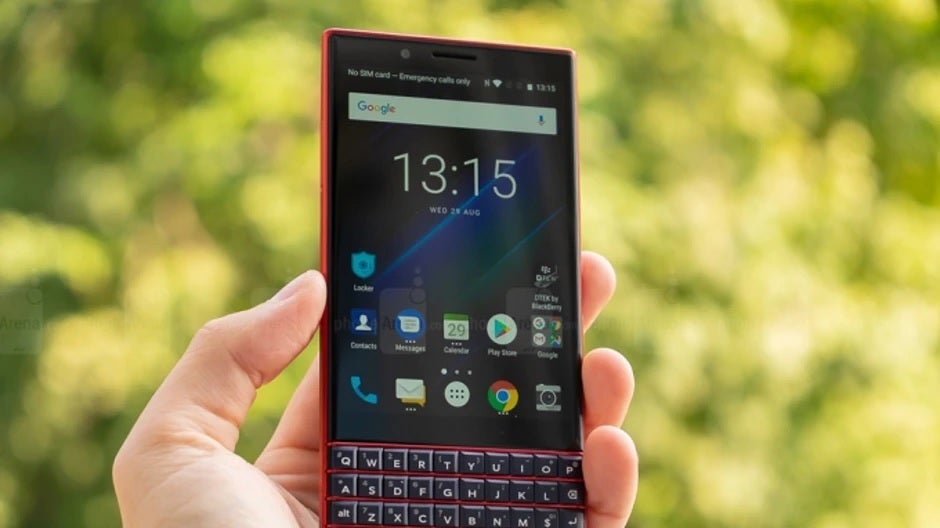What happened to the 5G BlackBerry that OnwardMobility promised for this year?

In August 2020 BlackBerry fans felt a tingle down their spines. After TCL stopped making phones using the iconic BlackBerry name for the U.S. and other markets in February 2020 (the last model TCL made was the BlackBerry KEY 2 LE), it seemed that the final nail had been driven into the coffin. But just seven months later, BlackBerry announced a new licensing deal with OnwardMobility and FIH Mobile Limited.
OnwardMobility has not delivered the first 5G BlackBerry that it promised for the first half of this year
OnwardMobility and its partner said that they were going to develop a new BlackBerry that would arrive during the first half of this year with support for 5G connectivity. And the new licensees knew what differentiates a BlackBerry from any other handset by announcing that the handset would be equipped with a physical QWERTY keyboard. But as PCMag points out, 2021 has but just a few weeks of life remaining and no one has heard a peep from OnwardMobility.

The KEY2 LE is the last new BlackBerry launched in the U.S. to date
The company said back in February that it had hired some staff including a European business head and a director of government sales. But in an email to PCMag, OnwardMobility recently wrote, "Right now, OnwardMobility is unable to share more details or conduct any interviews. Thanks for your patience as they continue developing the world’s most productive, user-friendly and secure mobile device."
Surely there are enough fans of physical keyboards that the first to sport 5G support could be of interest to them. Right now, a company called Unihertz has been pushing out the Titan priced at $340. The device looks like an Android-powered version of the BlackBerry Passport with its wide body and larger QWERTY keys. Unihertz also produced a version of Titan that is 30% smaller. This model, the Titan Pocket, will cost you $300 (and is currently on backorder).
BlackBerry was the second-largest smartphone company in the world during 2006. That year, the last before the iPhone made its debut in 2007, saw the industry ship a total of 64 million smartphones for the entire year. Compare that figure with the 1.38 billion units shipped in 2020. Nokia was the leading manufacturer of smartphones in those days with close to a 50% share of the market.
In 2007, BlackBerry sold 11.77 million smartphones compared to the 3.3 million iPhone units delivered by Apple. Nokia shipped a leading 60 million+ smartphones that year with BlackBerry in second place. By 2008, BlackBerry parent Research In Motion (RIM) figured that it had to take on Apple (which shipped 13.8 million iPhone units in 2008 compared to 23.6 million BlackBerry handsets) so it came up with the BlackBerry Storm.
The idea was that the user would tap on the touchscreen and get the same tactile experience of pressing on a real keyboard key. The first variant of the device was a big fat failure as the device did not have Wi-Fi support, and there was no app store to speak of. Still, Verizon did sell a ton of them although almost every single unit was sent back to the carrier for repair. The BlackBerry Storm 2 did get the keyboard right and added Wi-Fi connectivity, but by then it was too late.
By 2011, 93.1 million iPhone smartphones shipped compared to 51.1 million BlackBerry handsets. You can read what BlackBerry's response to the iPhone was by reading about the arrogant and clueless quotes attributed to co-CEOs Jim Balsillie and Mike Lazaridis after the iPhone was unveiled in January 2007. The executives did not see the iPhone as a threat until it was too late.
BlackBerry fans deserve to know what is happening with the phone that they were promised
BlackBerry started offering touchscreen phones with physical QWERTY keyboards. On some models, the keyboard would slide out of the way to leave more room for the display. One of the better BlackBerry models to combine a touchscreen and a physical keyboard was the Bold 9930. But software continued to hold BlackBerry back until it finally gave in and installed Android to run the BlackBerry Priv in 2015 finally giving BlackBerry users the app store that they had been demanding.


Fans of BlackBerry were hoping that OnwardMobility would give them everything they wanted from a modern 'Berry including the physical keyboard, flagship quality cameras, a powerful chipset, a huge battery, and 5G capability. The licensee is already running late and it would be nice to get a statement from the company outlining just exactly what is going on. The company owes that to the legions of BlackBerry fans whose hopes it had raised early last year.
Follow us on Google News













Things that are NOT allowed:
To help keep our community safe and free from spam, we apply temporary limits to newly created accounts: